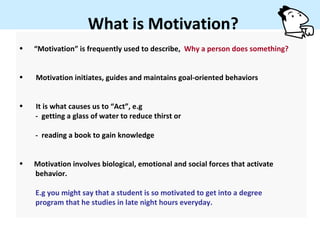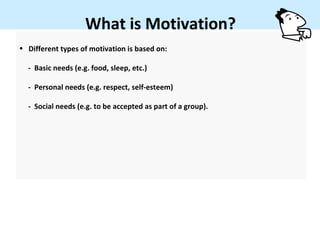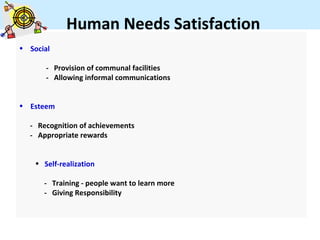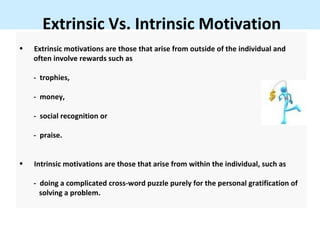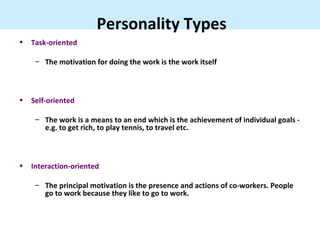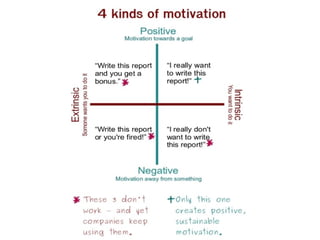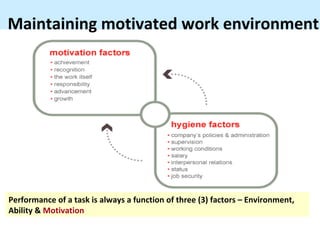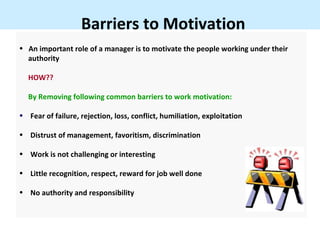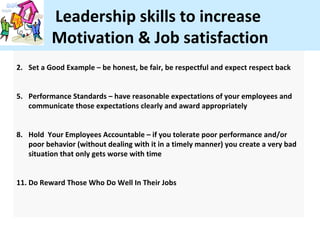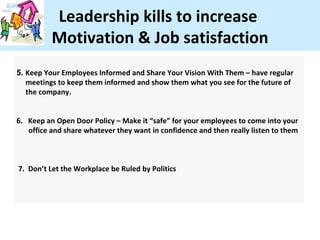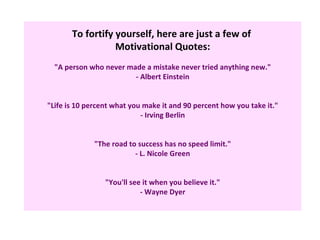Motivation
- 1. EMPLOYEE MOTIVATION By: Aftab Ahmed (HOD QA-QC department) Date: Feb. 9th 2012
- 2. What is Motivation? âĒ âMotivationâ is frequently used to describe, Why a person does something? âĒ Motivation initiates, guides and maintains goal-oriented behaviors âĒ It is what causes us to âActâ, e.g - getting a glass of water to reduce thirst or - reading a book to gain knowledge âĒ Motivation involves biological, emotional and social forces that activate behavior. E.g you might say that a student is so motivated to get into a degree program that he studies in late night hours everyday.
- 3. What is Motivation? âĒ Different types of motivation is based on: - Basic needs (e.g. food, sleep, etc.) - Personal needs (e.g. respect, self-esteem) - Social needs (e.g. to be accepted as part of a group).
- 4. Human Needs Satisfaction âĒ Social - Provision of communal facilities - Allowing informal communications âĒ Esteem - Recognition of achievements - Appropriate rewards âĒ Self-realization - Training - people want to learn more - Giving Responsibility
- 5. Extrinsic Vs. Intrinsic Motivation âĒ Extrinsic motivations are those that arise from outside of the individual and often involve rewards such as - trophies, - money, - social recognition or - praise. âĒ Intrinsic motivations are those that arise from within the individual, such as - doing a complicated cross-word puzzle purely for the personal gratification of solving a problem.
- 6. Personality Types âĒ Task-oriented â The motivation for doing the work is the work itself âĒ Self-oriented â The work is a means to an end which is the achievement of individual goals - e.g. to get rich, to play tennis, to travel etc. âĒ Interaction-oriented â The principal motivation is the presence and actions of co-workers. People go to work because they like to go to work.
- 8. Maintaining motivated work environment Performance of a task is always a function of three (3) factors â Environment, Ability & Motivation
- 9. Barriers to Motivation âĒ An important role of a manager is to motivate the people working under their authority HOW?? By Removing following common barriers to work motivation: âĒ Fear of failure, rejection, loss, conflict, humiliation, exploitation âĒ Distrust of management, favoritism, discrimination âĒ Work is not challenging or interesting âĒ Little recognition, respect, reward for job well done âĒ No authority and responsibility
- 10. Leadership skills to increase Motivation & Job satisfaction 2. Set a Good Example â be honest, be fair, be respectful and expect respect back 5. Performance Standards â have reasonable expectations of your employees and communicate those expectations clearly and award appropriately 8. Hold Your Employees Accountable â if you tolerate poor performance and/or poor behavior (without dealing with it in a timely manner) you create a very bad situation that only gets worse with time 11. Do Reward Those Who Do Well In Their Jobs
- 11. Leadership kills to increase Motivation & Job satisfaction 5. Keep Your Employees Informed and Share Your Vision With Them â have regular meetings to keep them informed and show them what you see for the future of the company. 6. Keep an Open Door Policy â Make it âsafeâ for your employees to come into your office and share whatever they want in confidence and then really listen to them 7. Donât Let the Workplace be Ruled by Politics
- 12. To fortify yourself, here are just a few of Motivational Quotes: "A person who never made a mistake never tried anything new." - Albert Einstein "Life is 10 percent what you make it and 90 percent how you take it." - Irving Berlin "The road to success has no speed limit." - L. Nicole Green "You'll see it when you believe it." - Wayne Dyer


